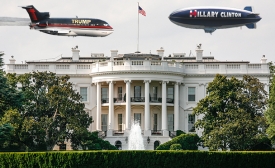2016 presidential election
Donald J. Trump’s stunning upset over Hillary Clinton to become the 45th president of the United States has shocked the world. His triumph holds the potential for overturning the world order. Criticisms of trade, immigration and international engagement were central to his candidacy. [...] On Wednesday, leaders reacted to a reshaped world.

Explore the relationship between politics, perception and public diplomacy in this special U.S. Presidential election blog roundup.
Because of the United States’ predominant role in geopolitics and global economics, foreign governments and their citizens scrutinize the candidates and their positions, which can hint at future American policies. The campaign also acts as a snapshot of American democracy. According to political scientist Joseph Nye, America’s soft power – its ability to persuade foreign leaders and exert influence abroad – partly depends on how the rest of world interprets our political process, values and outcomes.
While the days of its worst behavior are long behind it, the United States does have a well-documented history of interfering and sometimes interrupting the workings of democracies elsewhere. It has occupied and intervened militarily in a whole swath of countries in the Caribbean and Latin America and fomented coups against democratically elected populists.
Nearly a decade later, the 24-year-old is bringing her idea to life through a program in Senegal that encourages young women in coding and technology. She is developing a mobile phone application that will allow teachers, parents and students to swap books and supplies. It's called WECCIO, or "exchange" in the local Wolof language.
How would you explain Donald Trump to a foreign audience? Could it be done in a coherent way? Could it be done at all? To citizens at home, this may be merely an intriguing exercise. But to our country's diplomats it is a daily challenge. As part of their jobs, especially if they are public diplomacy officers, as I was, they are charged with "telling America's story to the world," and this includes describing the leading figures and issues in an election year.

Markos Kounalakis on whether America could elect a woman as president.







